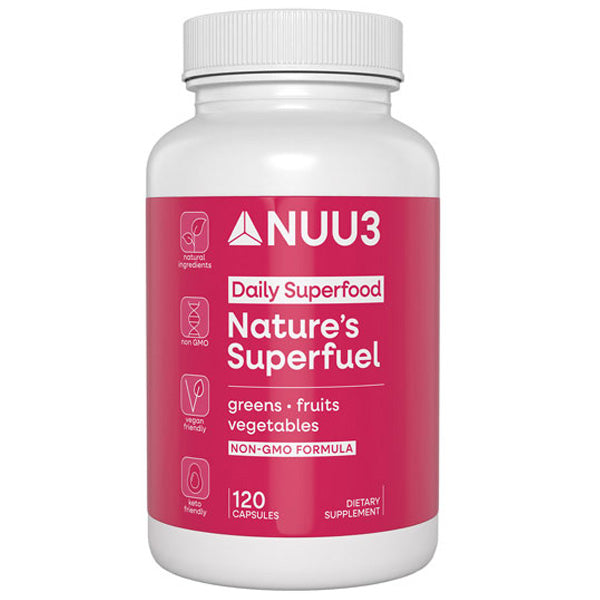Why does protein cause constipation? Let's find out

Protein is a vital part of a healthy diet. Healthcare providers and nutritionists recommend consuming enough protein daily to stay healthy, improve athletic performance, and more. However, when individuals start experiencing constipation, they may ask the question “Does protein make you constipated?” To answer this, it is necessary to understand the relationship between protein intake and constipation. This post will provide you with more information on the effects of protein on the body and offer tips on how to relieve constipation, so read on to learn more.
Does Protein Cause Constipation?
Protein is a macronutrient and is essential for repairing and building the body’s tissues. This nutrient is a building block of muscles, bones, skin, and cartilage. You need to consume enough protein during the day to stay healthy but some people who adhere to a high-protein diet report constipation as a side effect. So, does protein make you constipated?
There have been studies showing a connection between a high-protein diet and constipation. A paper from the European Journal of Clinical Nutrition discussed[1] the effects of high- and low-protein diets and reported that high intake of protein was associated with bloating, fullness, and gastrointestinal problems such as constipation.
Constipation is a widespread issue and is often caused by dietary factors. However, medications can also be culprits of constipation and other stomach issues, so if you’re asking “Do antibiotics cause constipation?” Yes, they can, although often diarrhea is a more common side effect with their use.
The Connection Between Protein and Constipation
How does protein make you constipated? It is the lack of fiber in high-protein diets that causes constipation, not the protein itself. Protein promotes satiety[2], which means it keeps you feeling full for longer periods. A high-protein diet is often recommended for weight loss. However, it’s important to note that carbohydrates are also essential for a balanced diet. It is also worth mentioning that fiber suppresses appetite prevents overeating and is important for maintaining good digestive health.
The main function of dietary fiber is to increase the weight and size of your stool and soften it. Bowel movements improve because a bulky stool is easier to pass. Other benefits[3] of fiber include weight management, better gut health, improved cardiovascular health, and lower risk of diabetes.
How does fiber relate to the question “Does protein make you constipated?” Since a high-protein diet lacks fiber, the stool doesn’t become bulky. As a result, it’s more difficult to pass and you’re likely to develop constipation.
Due to the lack of fiber, the food waste sits in your bowels and the fecal matter becomes more solid and harder to pass. Consuming high-fiber drinks could help ease constipation. However, other management options are available, which will be further discussed below.
How Much Protein Should You Eat Every Day?
Your protein needs depend on factors such as age, health goals, activity levels, and weight. The recommended daily[4] protein intake is 0.36 grams per pound or 0.8 grams per kilogram of body weight.
A person of moderate weight who doesn’t lift weights should make sure protein accounts for 10% to 35% of daily calorie intake. The average U.S. male would need around 34-56 grams of protein[5] a day whereas an average woman needs between 34 to 46 grams a day. If you’re trying to increase muscle, you may need 1.2 to 2 grams[6] of protein per kilogram of body weight during the day. Taking more than 2 grams[7] of protein per kilogram of body weight is considered an excessive intake.
Since protein is necessary for good health and well-being, it’s easy to think the more you eat, the better. However, not only does protein make you constipated, but excessive amounts can cause other side effects, too.
Other Side-effects of Getting too Much Animal-based Protein
As seen above, the answer to the question “Does protein make you constipated?” is that lack of fiber is often the main issue. That happens when a person overeats animal-based protein. However, constipation isn’t the only effect of excessive animal-based protein intake. Other effects include:
-
Weight gain: even though protein is necessary for steady weight loss, eating too much can lead to weight gain. That happens because excess protein consumed is stored as fat. Over time, this can make you gain additional pounds.
-
Brain fog and fatigue: consuming excessive amounts of protein causes fatigue because the body needs to work overtime to process it. Lack of nutrients from fiber-rich foods deprives the brain of the nutrients it needs to function properly. This can lead to brain fog and problems with concentration.
-
Bad breath: this side effect is mainly present in people on a Keto diet. A high ratio of protein in a diet encourages the body to use protein for energy rather than carbohydrates. That way you reach the state of ketosis and the production of ketones, which, unfortunately, leads to bad breath.
-
Dehydration: since a high-protein diet causes kidneys to work overtime to eliminate excess nitrogen from amino acids, you could be susceptible to dehydration. That happens because you may need to urinate more than usual.
-
Diarrhea: in an attempt to consume enough protein during the day, some people may opt for dairy and processed foods, which could lead to diarrhea.
Ways to Avoid Protein-Related Constipation
Constipation is always an uncomfortable problem, but it can be prevented and managed successfully regardless of its cause. Here’s what to do:
-
Increase fiber intake: you need to increase the intake of fiber to prevent or manage constipation. Good sources of fiber are vegetables, fruits, whole grains, legumes, and nuts. Use these foods to create healthy high-fiber drinks.
-
Stay hydrated: inadequate water intake[8] plays a role in constipation. To improve digestion and promote bowel movements, you need to drink more water. Drinking around eight glasses of water during the day is recommended. Combine water intake with other approaches such as eating more fiber and doing exercise for constipation.
-
Exercise: regular exercise can help relieve constipation[9]. There is no specific exercise for constipation, but any type of physical activity can improve bowel movements. Options are endless including running, jogging, walking, swimming, and yoga.
-
Try bowel retraining: choose a specific time of day to have a bowel movement. The best time is 20 to 40 minutes after eating. Ideally, it should be in the morning after breakfast. For the best results combine this approaches with drinks that make you poop.
-
Use supplements for gut health: one of the best ways to prevent or relieve constipation is to ensure your gut is healthy. Products like NUU3 Gut Health 365 work specifically to promote good bacteria, ease digestive discomfort, optimize absorption of nutrients, and support immune health.
What to Do if The Above Strategies Don't Work?
If you consume high-fiber drinks regularly and they don’t work as you expected them to, you may wonder what to do next. The most important thing is to try several approaches rather than sticking to a single management method.
In addition to drinks that make you poop, you should also modify your diet to include more fiber, exercise, and use supplements containing probiotics for gut health.
When it comes to supplements, other types of products could also help you find relief from constipation caused by protein. A good example is NUU3 Apple Cider Vinegar Gummies because they improve your digestion, while also supporting heart health, and boosting immune function.
Moreover, taking NUU3 Nature’s Superfuel is an excellent option because, in addition to improving digestion, it boosts energy levels. You can use that energy to improve athletic performance and get the most from your exercise routine.
If you think exercise for constipation and other approaches aren’t enough, you may want to schedule an appointment with your doctor who will recommend other ways to help. For example, they may instruct you to reduce your intake of certain types of protein or suggest using a footstool in the bathroom to improve bowel movements.
Another useful method to try is to track your diet and symptoms. Keep a food journal to write everything you eat and drink during the day. Whether you consume drinks that make you poop that day or not, list all foods and beverages, along with any symptoms you may have experienced. Include when you feel constipated, how you’re feeling, details of your bowel movements, and anything else you may think is useful.
When you read the journal, it will be easier to determine whether protein is the primary cause of constipation or if there are other contributing factors.
Frequently Asked Questions
What are the signs of too much protein?
Excessive consumption of protein manifests itself through various symptoms including dehydration, kidney strain, nutrient imbalances, nausea, headaches, fatigue, and digestive issues such as constipation. Make sure to stick to the recommended protein intake during the day.
What protein is good for constipation?
Plant-based protein is good for constipation because these foods are also abundant in fiber. Fiber is necessary for digestion and regular bowel movements. Enrich your diet with plant protein sources such as beans, lentils, and chickpeas. When you’re on the go, you can have high-fiber drinks to aid your digestion and alleviate constipation, especially if you’re on a high-protein diet.
Which protein does not cause constipation?
To avoid constipation, consume more fiber and opt for protein sources like lean meats, fish, eggs, and tofu. You can also opt for drinks that make you poop so you can feel better quickly.
Takeaway
Not only does protein make you constipated, but it can also cause many other adverse reactions when consumed excessively. As you’ve seen from this post though, often protein itself isn’t the biggest problem, but lack of fiber.
You can relieve this gastrointestinal issue through increased fiber intake, modifying protein consumption, staying hydrated, and engaging in exercise for constipation.
References
1] ↑https://www.ncbi.nlm.nih.gov/pmc/articles/PMC3392894/
2] ↑https://www.ncbi.nlm.nih.gov/pmc/articles/PMC4258944/
3] ↑https://www.ncbi.nlm.nih.gov/pmc/articles/PMC3399949/
4] ↑https://www.health.harvard.edu/blog/how-much-protein-do-you-need-every-day-201506188096
5] ↑https://www.healthline.com/nutrition/how-much-protein-per-day
6] ↑https://www.mayoclinichealthsystem.org/hometown-health/speaking-of-health/are-you-getting-too-much-protein
7] ↑https://www.ncbi.nlm.nih.gov/pmc/articles/PMC8017325/
8] ↑https://www.ncbi.nlm.nih.gov/pmc/articles/PMC2908954/
9] ↑https://pubmed.ncbi.nlm.nih.gov/30843436/













